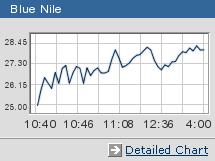
NEW YORK (CNN/Money) -
What a difference a Google makes.
At the beginning of the year, it was looking like 2004 wouldn't be a big one for tech IPOs. After all, healthcare related IPOs were outperforming the few tech ones that dared to test the public markets and investors were still eagerly waiting for search engine king Google to file.
But once Google finally did that in late April, tech IPO buzz has returned with a vengeance.
On the heels of Google, there have been a flood of tech company IPO filings, including PlanetOut, an online media firm focusing on the gay and lesbian community, eCost.com, an online discount retailer that is a spin-of of PC Mall, RightNow Technologies, a developer of customer service software that originally filed to go public in April 2000, and Sybari Software, which sells antivirus and anti-spam software.

| |
|
Shine on, you crazy diamond: Online jewelry retailer Blue Nile surged on the day of its IPO.
|
|
What's more, Blue Nile (NILE: Research, Estimates), an online jeweler, began trading Thursday morning and the stock finished the day nearly 40 percent higher than its offering price of $20.50. Another e-commerce company, Alibris, which sells used and hard-to-find books over the Web, is tentatively scheduled to debut Friday.
So is this a sign of a new tech bubble in the making? Surprisingly, that does not appear to be the case.
Tech IPOs that are making money? Imagine that.
Sure, at first glance, many of these tech IPOs may seem reminiscent of the dregs from the late 90's and early 2000. Online retailers, media companies and specialty software? We've been here before. But several of the techs that have filed to go public recently are actually profitable, a welcome change from the bubble days.
Blue Nile, for example, made money in 2002 and 2003 and reported a net profit of $1.9 million in the first quarter of this year on sales of $35.8 million. And one IPO observer thinks that investors have actually become more discriminating, which should lead to more tech IPOs from profitable companies like Blue Nile, and less fluff like Pets.com.
| More about tech IPOs
|

|
|
|
|
"The investor revolt that happened as a result of the bubble bursting has yielded a new footprint for tech stocks," said David Menlow, president of IPO research firm IPOfinancial.com. "Many of the companies that are filing for IPOs are more appealing to investors because the bar has been set very high."
So investors should expect the tech IPO wave to continue. Another heavily hyped company, software leasing firm Salesforce.com, should probably start trading within the next few weeks, assuming its CEO Marc Benioff can learn to keep his mouth shut during the quiet period.
(Comments from Benioff in a New York Times article earlier this month have apparently prompted the company to delay its offering)
But there's some fluff to be avoided
Still, investors, as always, need to be wary of IPOs at first. Typically, even the highest quality tech IPOs cool off after their first day. So rather than chasing something like Google the moment it goes public, it probably pays to wait a while.
And investors have to do their homework. They should especially remember the lessons learned from the tech stock crash of 2000-2002. Earnings matter.
| Recently in Tech Biz
|

|
|
|
|
Google has the potential to be a successful tech IPO because it is wildly profitable. And Blue Nile seemed to be doing well Thursday not because of breathless hype about how gigantic the market for selling diamonds will be in 2008 but because the company already has proven it can make money.
That's why Alibris, once it starts trading, may have a tougher time. The company has lost money during the past three years. And losses escalated in the first quarter of 2004. The company reported a net loss of nearly $5 million, compared to a $3 million loss in the same period a year ago.
And my colleague Eric Hellweg pointed out a few weeks ago that investors need to be extremely wary of two other techs that filed just before Google did, online marketing company Claria (formerly Gator... the company behind many annoying pop-ups) and Linux company Lindows.
Simply put, some tech companies are better off not going public. Some may find that selling out to a larger rival may be a better alternative to going public. To that end, anti-spam software company Brightmail, which filed for an IPO in March, announced on Wednesday that Symantec, one of the company's investors, was purchasing it.
And for others, staying private until they can demonstrate a solid track record of success would be wise. A recent study by Wayne Shaw, a professor at the SMU Cox School of Business in Dallas, indicates that of the 3,941 companies that went public between 1995 and 2001, 20 percent would have been better off if they had withdrawn their offerings.
So the trick for investors is to stick to tech IPOs from companies that are already doing well, not those that are merely promising to do well in the future.
Sign up to receive the Tech Investor column by e-mail.
Plus, see more tech commentary and get the latest tech news.

|

